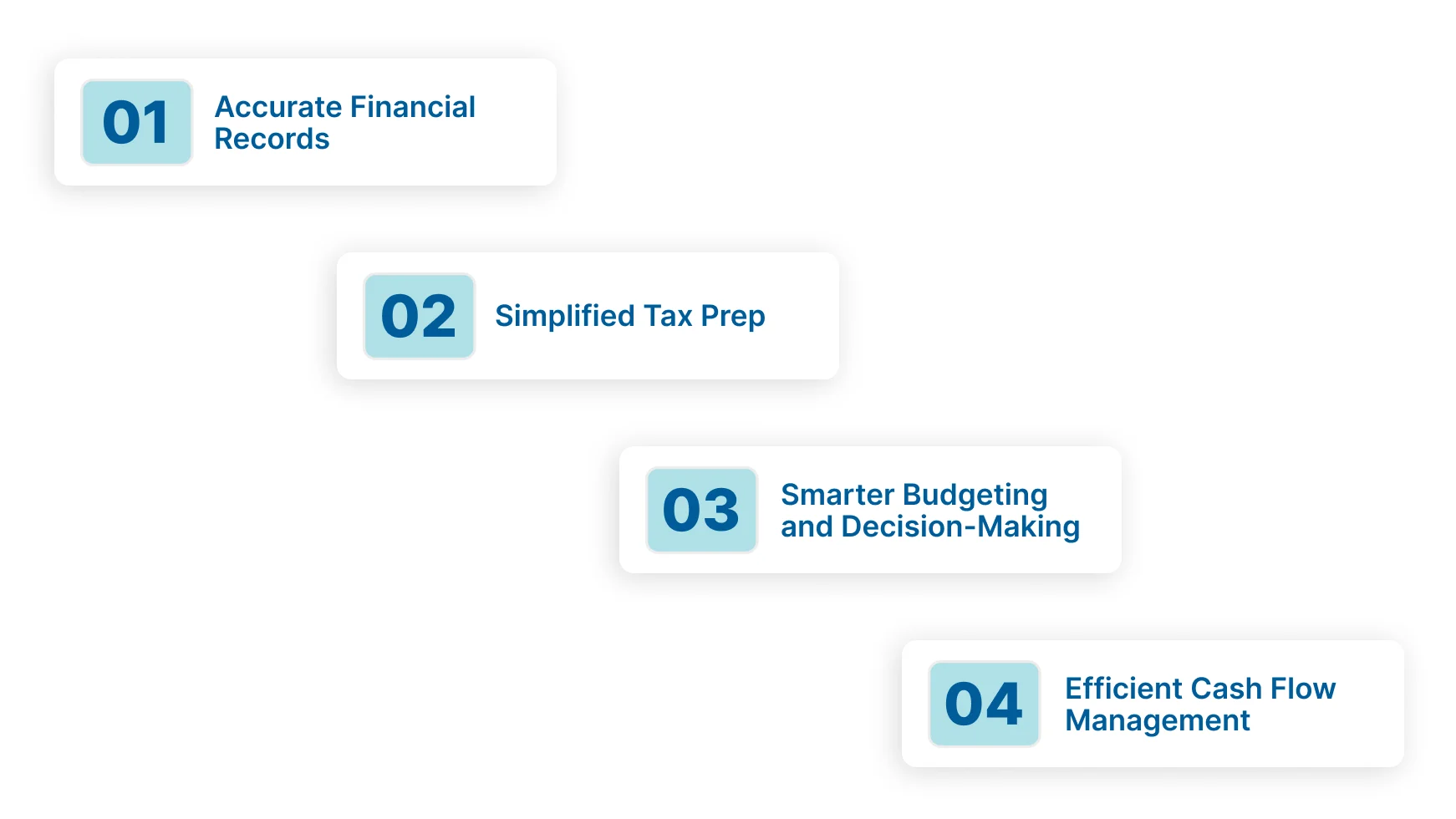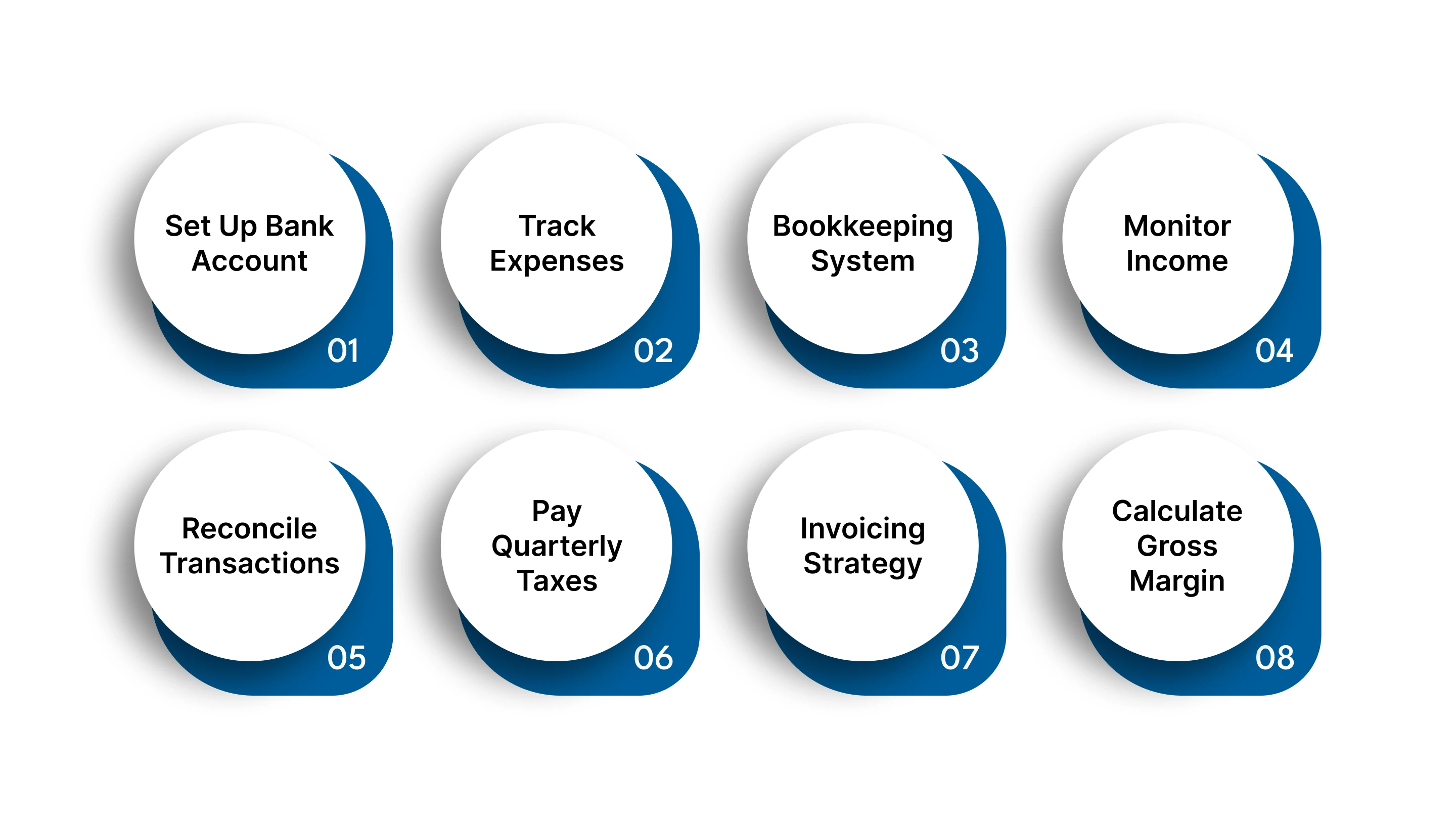%20(24).webp)
Running a daycare isn’t just about caring for kids; it’s about managing numbers, balancing budgets, and keeping the books in order. And here’s the truth: nearly 70% of childcare organizations struggle to hit their enrollment targets and retain families. This directly throws off their revenue forecasts and makes accounting a nightmare.
If you’re facing unpredictable income, mounting expenses, or confusion around taxes, you’re not alone. But there’s good news: mastering daycare accounting doesn’t have to be overwhelming.
This blog will explore smart steps that’ll help you take control of your finances and avoid the common pitfalls many daycare owners face. From tracking expenses to staying on top of compliance, we’ll cover everything you need to keep your daycare’s financial health in check. Let’s jump in.
Daycare bookkeeping involves keeping track of your program’s financial transactions. It involves systematically recording every dollar that enters and leaves your business, helping you understand your financial health.
Key bookkeeping tasks include:
Daycares typically use one of two bookkeeping methods: single-entry or double-entry.
It is a simpler approach where each transaction is recorded once, either as income or an expense. This method works well for smaller daycares with straightforward finances, much like balancing a personal checkbook.
This sort of bookkeeping is more advanced and gives a more detailed view of your finances. Every transaction is recorded twice, once as a debit and once as a credit. It’s ideal for larger daycares, as it helps ensure financial accuracy by keeping accounts balanced.
Now that we know what bookkeeping is, let’s clear up the difference between bookkeeping and accounting.
While both bookkeeping and accounting are integral to managing your daycare's finances, they serve distinct functions. Recognizing these differences helps you identify the specific financial support your program requires.
Bookkeepers manage the daily details of your finances, while accountants use that data to offer strategic advice and ensure long-term success.
With that distinction in mind, let’s look at the key benefits of having solid bookkeeping practices in your daycare.

Proper bookkeeping for your daycare isn’t just about staying compliant; it’s a crucial factor for your business’s growth and success. Here’s how:
Understanding these benefits helps you confidently make decisions that keep your daycare financially stable and set up for long-term success.
Also Read: Top Benefits of Outsourcing Accounting Services to India for US Small Businesses
Now that you understand the benefits, let’s go over the essential steps to mastering daycare accounting.

Daycare accounting doesn’t have to be complicated. By following a few smart steps, you can gain control over your finances and avoid costly mistakes.
One of the first steps in establishing a professional daycare business is opening a separate business bank account. Many daycare owners initially use their personal bank accounts, which can lead to confusion and costly accounting errors.
While sole proprietors aren't legally required to have a separate account, it’s highly recommended for clarity and easier tax preparation. For LLCs, partnerships, and corporations, a separate account is mandatory.
By keeping detailed records, you can easily identify tax-deductible expenses and monitor your business growth. Using software or spreadsheets will help you stay organized and avoid discrepancies.
It’s essential to stay on top of these expenses to ensure your daycare remains profitable and that your business doesn’t exceed its budget.
Setting up a consistent bookkeeping system early on can prevent stress and confusion later. Whether you opt for a DIY approach using spreadsheets or employ accounting software, consistency is key.
Many daycares start by using QuickBooks or Xero, which can automatically track income, expenses, and taxes, saving time and reducing human error. At VJM Global, we specialize in utilizing tools like QuickBooks and Xero to streamline your accounting processes, ensuring accuracy and efficiency for your daycare business.
For daycare owners, monitoring income is just as important as managing expenses. Since you’ll often receive upfront payments for services, it’s important to keep track of this income so you can allocate it properly.
Maintaining accurate records of incoming funds will help you track profitability, determine pricing, and ensure enough funds are set aside for operating expenses and taxes.
Regularly reconciling your bank transactions with your accounting software is essential for maintaining financial accuracy. Every month, compare your bank statement with the records in your software to spot any discrepancies.
This process helps you stay on top of your business finances and prevents errors from slipping through the cracks. It’s especially important to check for missed expenses or income, ensuring your records are fully aligned with your bank’s statements.
Since daycare businesses often face fluctuating revenues, estimating your taxes every quarter helps keep you on track. You can use your accounting software to calculate your taxes or consult an accountant for assistance.
Paying taxes regularly ensures that you're never hit with a large, unexpected bill and gives you peace of mind knowing your tax obligations are covered.
An invoice serves as an official request for payment and a record for both you and your clients. Make sure your invoices are clear, professional, and itemized, including your business name, invoice number, and services rendered.
You can either create templates manually or use automated invoicing software to generate and send invoices electronically. This way, you can track payments and ensure no billing discrepancies.
Gross margin is calculated by subtracting your cost of goods sold (COGS) from your total revenue, then dividing that number by your revenue. A high gross margin indicates your daycare is thriving, while a low margin means it may be time to assess pricing or cut unnecessary costs.
Knowing your gross margin helps you make informed decisions about pricing, expenses, and business expansion.
While it’s possible to manage your daycare’s accounting on your own with the right software, hiring a professional accountant can enhance your financial management.
At VJM Global, we specialize in accounting outsourcing and tax planning for businesses like yours. Our team can assist you with financial reporting, reconciliations, and tax estimations, ensuring that your daycare’s finances are in top shape for growth and compliance.
Following these steps helps you gain better control over your daycare’s finances, allowing you to focus on providing quality care.
Also Read: Understanding Why Companies Use Accrual Accounting
At VJM Global, we specialize in providing expert accounting services tailored to your daycare business. Here’s how we can help:
VJM Global can simplify your daycare’s accounting, reduce financial stress, and help your daycare business grow with confidence.
Mastering daycare accounting may seem overwhelming, but with the right tools and strategies in place, it becomes manageable. Reconciliation, monitoring income, and paying quarterly taxes will ensure your daycare remains financially on track.
Working with professionals like VJM Global can take your accounting to the next level, providing expertise and ensuring compliance with all regulations.
Ensure accurate, efficient financial reporting with our expert accountants. Contact VJM Global today to streamline your daycare’s financial management!
Daycare accounting is crucial for managing your finances effectively, ensuring compliance with tax regulations, and maintaining profitability. It helps track income, monitor expenses, and make informed financial decisions.
Bookkeeping focuses on recording daily financial transactions and ensuring accuracy, while accounting involves analyzing those records, preparing financial reports, and providing strategic advice to help grow the business.
QuickBooks and Xero automate financial tracking, saving time and reducing errors. These tools help manage income, track expenses, and simplify tax calculations, ensuring your daycare’s financials are accurate and up-to-date.
While it's possible to manage accounting on your own with the right tools, hiring a professional accountant ensures accuracy, compliance, and peace of mind. They can also provide expert advice on tax planning and financial growth.
VJM Global specializes in accounting outsourcing, using tools like QuickBooks and Xero to streamline your financial management. We offer services like financial reporting, tax planning, and compliance support tailored to your daycare’s needs.